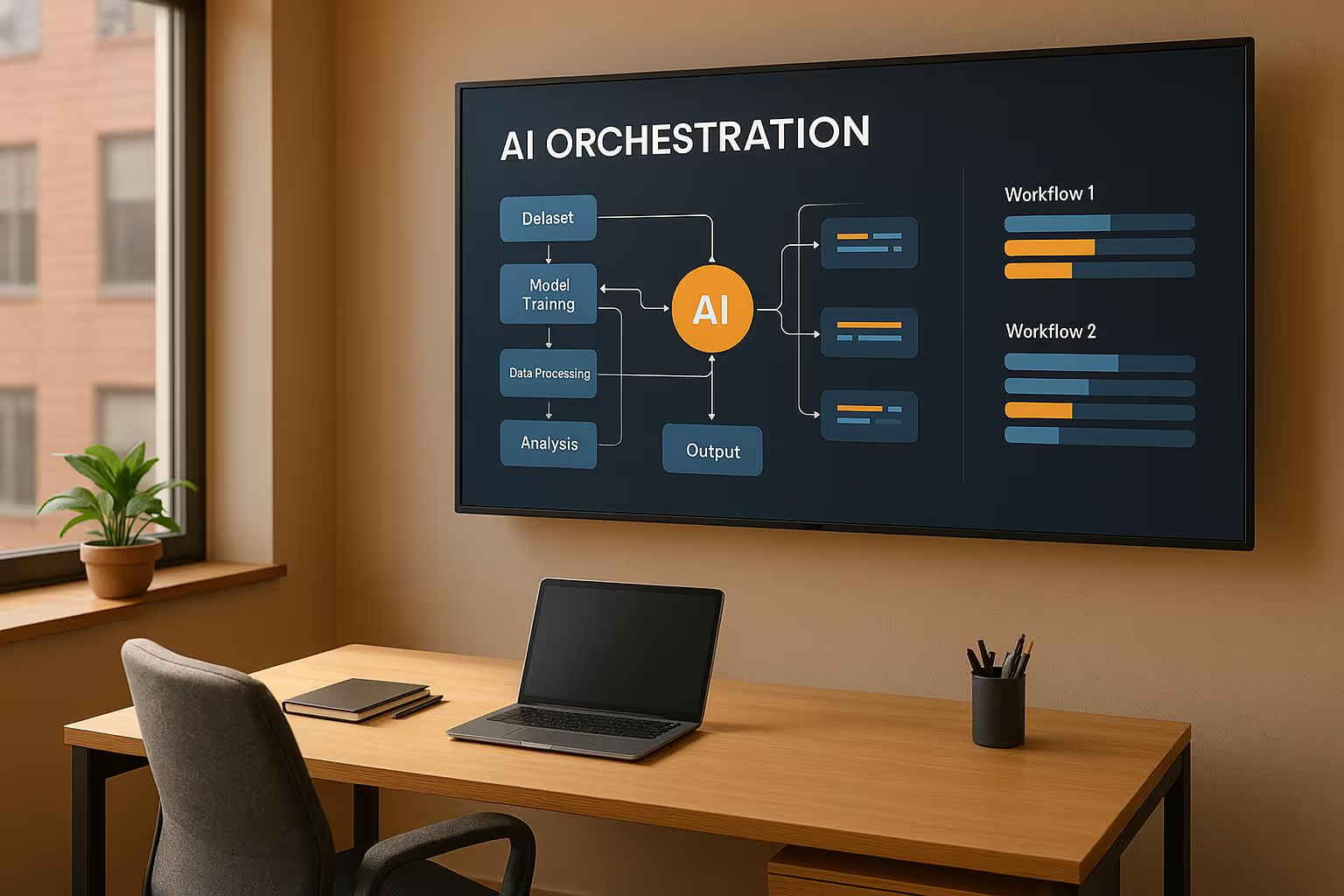
Managing AI workflows can be overwhelming. Tool sprawl, rising costs, and inconsistent oversight are common challenges for enterprises adopting AI. The solution? AI orchestration platforms. These tools centralize workflows, optimize spending, and enforce governance, helping businesses scale AI efficiently.
Here’s a quick look at the top platforms:
Each platform offers unique strengths in model support, automation, compliance, scalability, and cost management. A detailed comparison follows to help you choose the right tool for your needs.
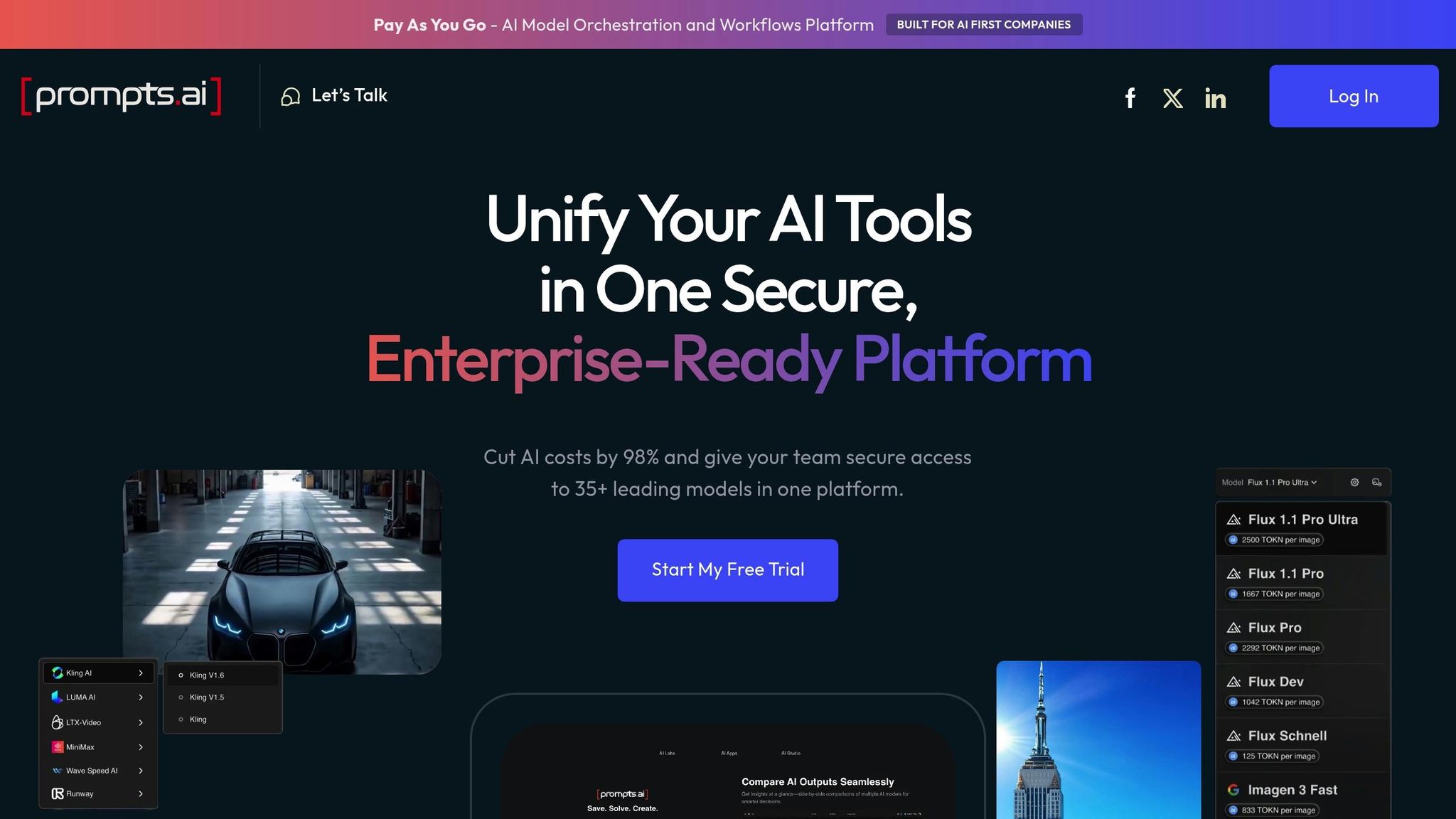
Prompts.ai is an advanced AI orchestration platform that brings together more than 35 top-tier AI models into one streamlined interface, eliminating the need to juggle multiple tools.
This platform provides seamless access to leading language models such as GPT-5, Claude, LLaMA, and Gemini. It also connects effortlessly to enterprise systems like Salesforce, SAP, and ServiceNow through API integrations, enabling automated workflows across CRMs, ERPs, and data warehouses.
For example, a Fortune 500 financial services company leveraged Prompts.ai to overhaul its customer onboarding and fraud detection processes. By integrating the platform with their existing CRM and compliance systems, they managed to cut manual review times by 60% and boost fraud detection accuracy by 30%.
With its visual workflow builder and low-code tools, Prompts.ai empowers teams to design and deploy AI-driven processes without needing deep technical skills.
The platform's orchestration engine handles complex, multi-step workflows, automating repetitive tasks, triggering actions, and syncing systems like Slack, Gmail, and Trello. This coordination extends across both human and machine agents, ensuring smooth operations.
"Grâce aux LoRas et aux flux de travail de Prompts.ai, il réalise désormais les rendus et les propositions en une seule journée. Plus besoin d'attendre, plus de stress lié aux mises à niveau matérielles."
– Steven Simmons, CEO & Founder
Prompts.ai also enables the creation of AI agents capable of managing intricate, multi-step processes on their own. These agents minimize manual effort while speeding up operations, paving the way for the governance and scalability features discussed below.
Prompts.ai ensures secure AI workflows by adhering to stringent standards like SOC 2 Type II, HIPAA, and GDPR. It includes role-based access controls, encrypted data, detailed audit trails, and policy management tools that monitor model usage and enforce ethical guidelines.
A dedicated Trust Center provides full transparency into security and compliance, allowing organizations to maintain consistent protocols and detailed audit records across their AI projects.
Designed with a cloud-native architecture, Prompts.ai scales effortlessly to accommodate increasing workloads while keeping expenses low through automated resource management.
Users can access top AI models with flexible pay-as-you-go TOKN credits, starting at $99 per member per month for the Core plan, $119 for Pro, and $129 for Elite. These pricing options align costs with actual usage.
Additionally, built-in FinOps tools offer detailed insights into token usage, optimize spending, and tie AI expenses directly to business outcomes. This approach can help organizations lower software costs by as much as 98%.
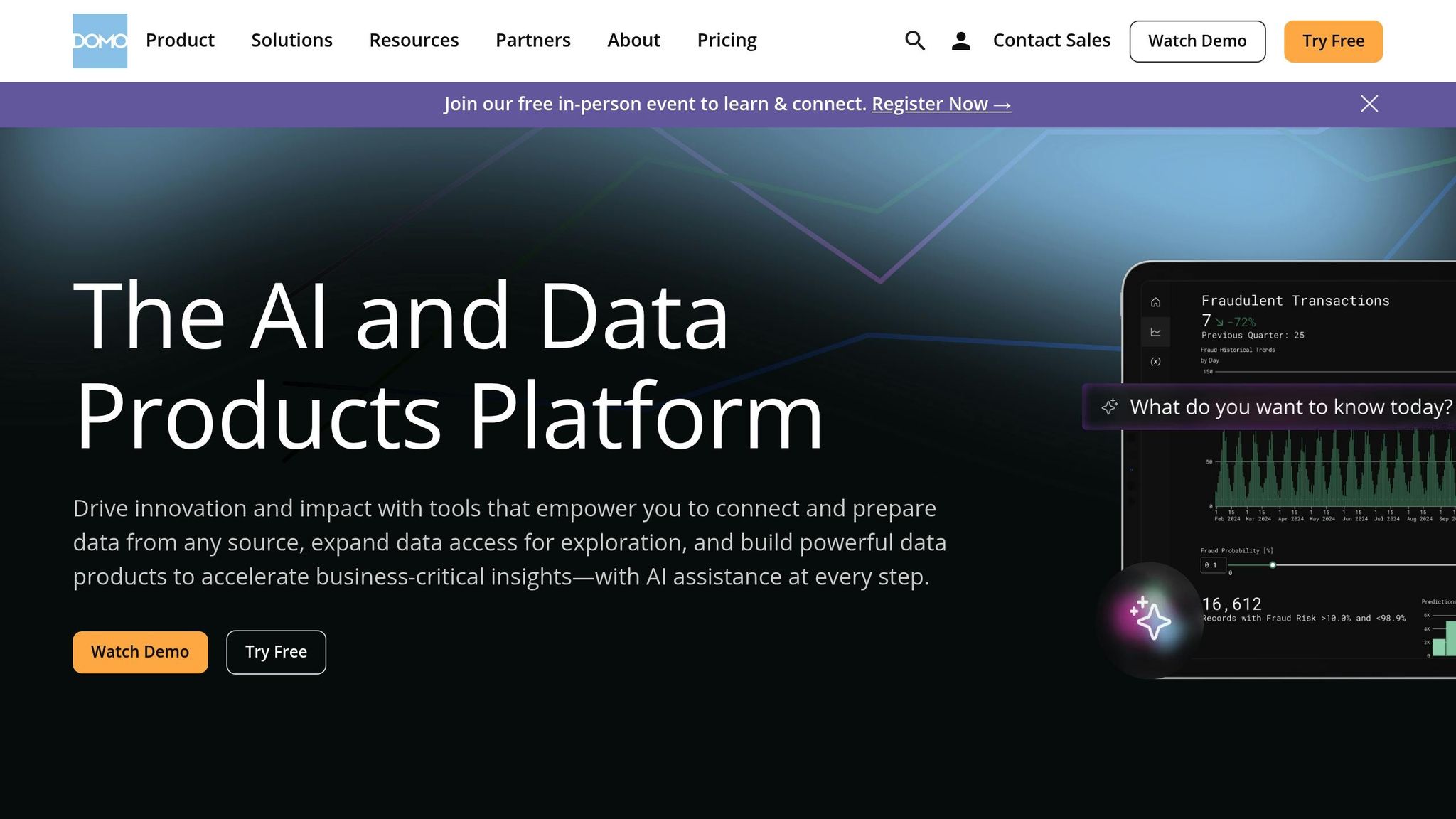
Domo is a cloud-based business intelligence platform designed to help organizations simplify their data workflows and bring together various data sources. By focusing on efficient data management and automation, it provides a strong base for businesses aiming to extract actionable insights and drive AI initiatives. Let’s explore its standout features that support AI workflows.
Domo brings together multiple data sources through a single, easy-to-use interface. This integration allows businesses to manage and prepare their data more efficiently. With its visual tools, users can build and automate data pipelines, making analytics and AI predictions a smoother process.
By automating repetitive data tasks, Domo empowers businesses to create multi-step workflows effortlessly. These automated processes keep data handling consistent, enabling quicker and more informed decision-making.
Domo prioritizes secure and compliant data management with features like role-based access controls and audit logs. Its cloud infrastructure is built to scale, ensuring it can handle growing data demands without compromising performance or reliability.
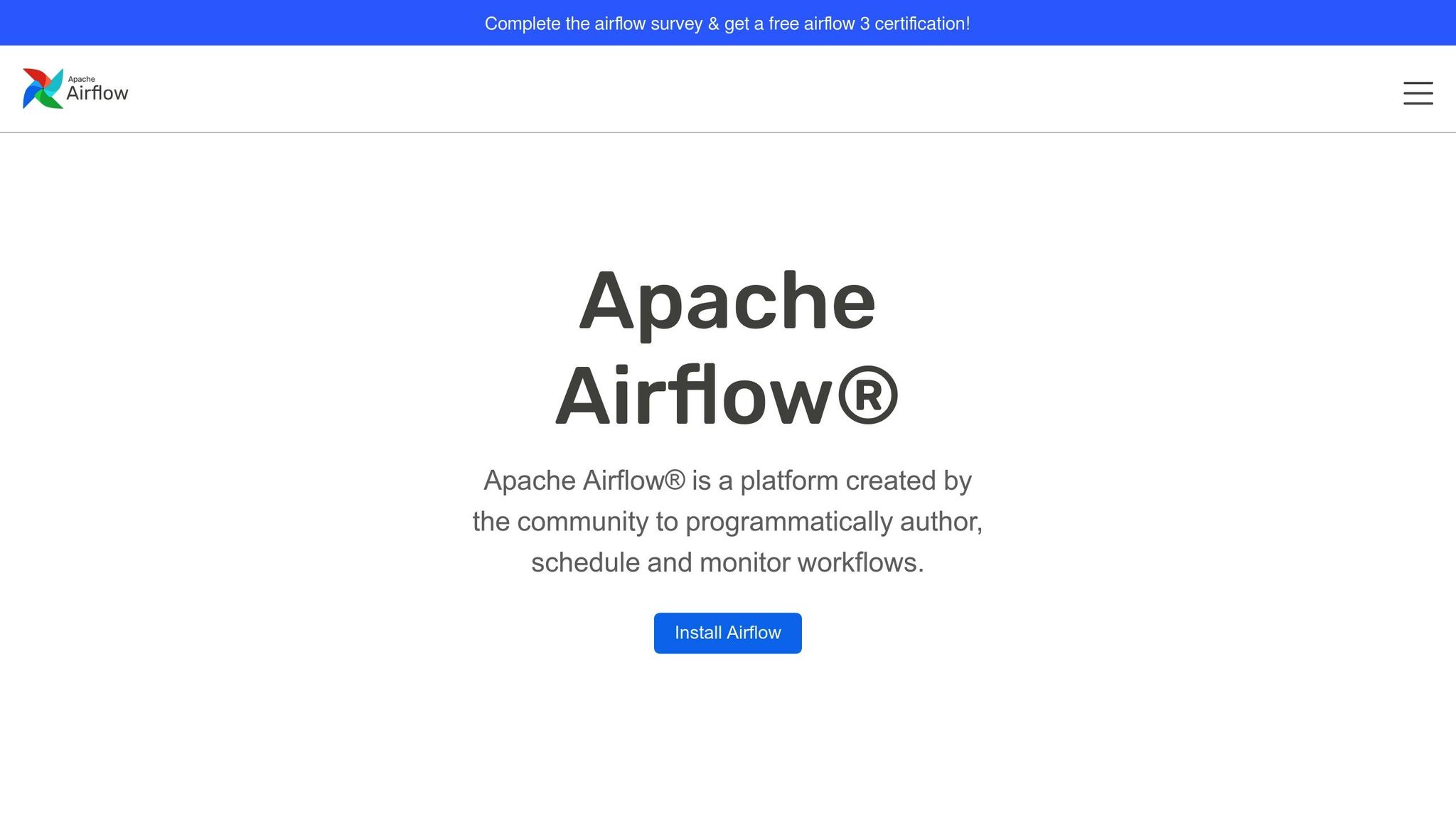
Apache Airflow, an open-source platform initially developed by Airbnb, simplifies managing complex AI pipelines through directed acyclic graphs (DAGs). These DAGs visually map out task dependencies and execution sequences, ensuring clarity and efficiency.
Apache Airflow revolutionizes AI workflow management by offering a code-first approach to automation. Teams can define pipelines using Python, which supports version control, testing, and streamlined maintenance. Its scheduler automatically triggers tasks based on specific conditions, such as time intervals, data availability, or external events. This ensures AI models are consistently updated with fresh data and execute predictions on time.
The platform excels at task dependency management, enabling precise sequencing of processes like data preprocessing, model training, validation, and deployment. If a task fails, Airflow retries it and alerts the team, preventing errors from cascading through the pipeline. This robust framework also facilitates seamless integration of models into workflows.
Airflow's extensive library of operators and hooks allows it to integrate effortlessly with most AI frameworks and cloud services. Whether working with TensorFlow, PyTorch, or scikit-learn, Airflow can manage model training and deployment across diverse environments. It also connects with major cloud providers like AWS, Google Cloud Platform, and Microsoft Azure.
The platform's XCom feature enables data sharing between tasks, allowing outputs from one stage to feed directly into the next. This functionality supports the creation of sophisticated AI pipelines that span databases, data lakes, and external APIs. Airflow's adaptability ensures smooth coordination between systems, making it an excellent choice for building end-to-end AI solutions.
Airflow’s distributed architecture, which can run on Kubernetes, is designed to scale with your needs. By adding worker nodes as computational demands grow, it optimizes resource usage and minimizes infrastructure costs. As an open-source tool, Airflow eliminates licensing fees and supports flexible deployment - whether on-premises, in the cloud, or in hybrid setups. This makes it a practical option for enterprises managing large-scale AI workflows.
Airflow offers detailed logging and monitoring tools critical for enterprise-level AI governance. Every task logs execution details, enabling easy auditing and troubleshooting. Its web-based interface provides real-time insights into workflow statuses, execution histories, and performance metrics.
The platform supports role-based access control, allowing organizations to manage who can modify or execute workflows. This feature is crucial for regulated industries where strict oversight of AI model changes is required. Integration with external authentication systems like LDAP and OAuth ensures that workflow access aligns with existing security protocols, delivering centralized control essential for enterprise compliance.
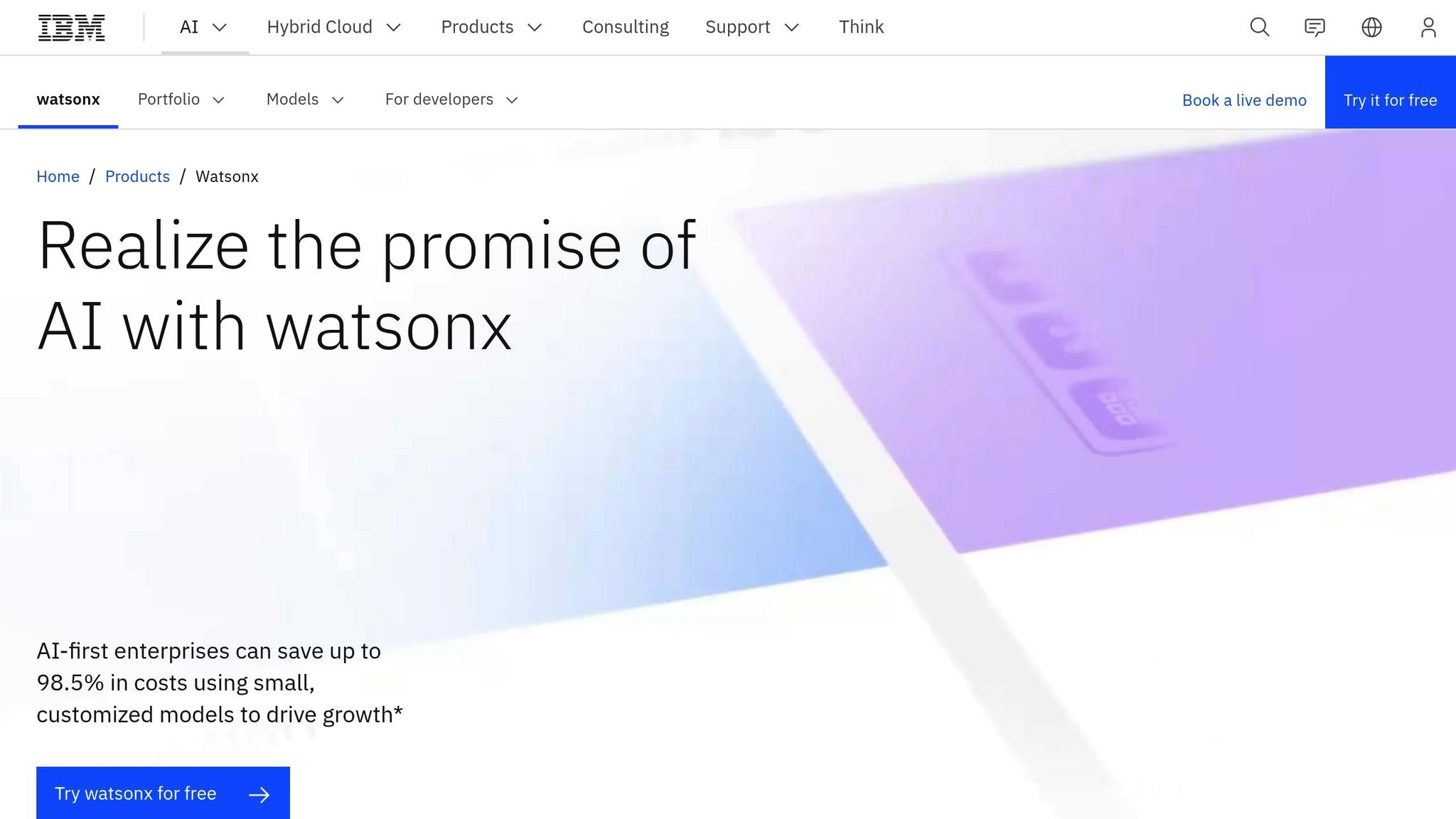
IBM watsonx serves as IBM's AI and data platform, designed to simplify the process of building, deploying, and managing AI models on a large scale. By centralizing AI operations, it helps enterprises tackle the challenges of tool sprawl and governance within a single, cohesive environment.
At its core, watsonx operates through three main components: watsonx.ai for developing AI models, watsonx.data for managing data, and watsonx.governance for overseeing AI compliance. The platform integrates effortlessly with existing enterprise systems using APIs and supports hybrid cloud setups across IBM Cloud, AWS, Microsoft Azure, and on-premises systems. With its workflow automation capabilities, teams can create comprehensive AI pipelines, covering everything from data preparation to model training, validation, and deployment - all without the need to juggle multiple tools.
Watsonx prioritizes enterprise security by incorporating encryption, role-based access controls, and detailed audit trails that comply with regulations such as GDPR and HIPAA. Its governance tools centralize policy management and provide robust model monitoring, ensuring all AI projects align with compliance standards. Additionally, built-in cost management features track resource usage and offer spending insights, enabling organizations to scale operations while keeping expenses in check.
These features position watsonx as a powerful solution in the AI orchestration space, as highlighted in the forthcoming comparison table.
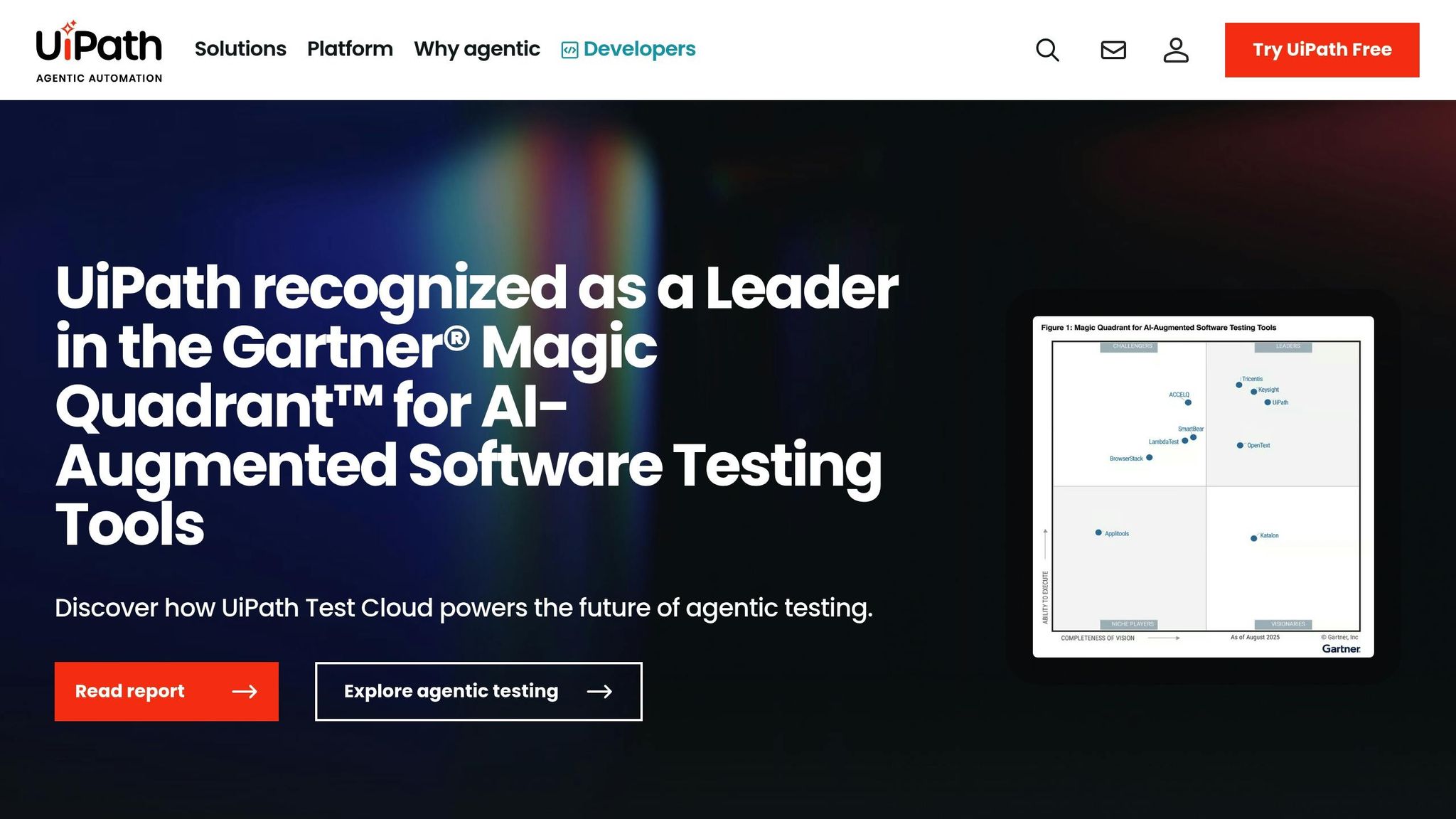
UiPath has grown into a robust platform that combines automated workflows with advanced AI capabilities. It equips enterprises to create comprehensive automation solutions by blending traditional robotic process automation (RPA) with machine learning, natural language processing, and computer vision technologies.
The UiPath Business Automation Platform acts as a central hub for managing AI-driven workflows across enterprise systems. Key components like UiPath Orchestrator handle the scaling and monitoring of automated processes, while UiPath Studio offers a visual interface to design workflows that seamlessly integrate AI models with business operations. It supports both attended and unattended automation, enabling AI-powered bots to work alongside human employees or operate independently.
The platform’s AI Center simplifies the deployment and management of AI models within workflows. It supports popular machine learning frameworks such as TensorFlow, PyTorch, and scikit-learn, and provides built-in models for tasks like document understanding, sentiment analysis, and data extraction. Its Document Understanding feature leverages optical character recognition (OCR) and natural language processing to handle a variety of document types efficiently.
UiPath offers a rich library of connectors for integration with platforms like SAP, Salesforce, Office 365, and Oracle. It supports both cloud-based and on-premises AI models, allowing organizations to maximize their existing machine learning infrastructure.
With its Apps feature, UiPath enables businesses to create custom applications that merge automation workflows with user-friendly interfaces, making AI tools accessible even to non-technical users. The platform’s API-first design ensures easy integration with third-party AI services and custom machine learning models, providing flexibility for diverse enterprise needs.
Governance is a key strength of UiPath, offering detailed audit trails that track actions performed by both automated processes and AI models. Administrators benefit from real-time analytics and reporting through UiPath Insights, which provides visibility into automation performance, compliance, and resource usage.
The platform ensures data security with role-based access controls, safeguarding sensitive workflows. Its compliance framework supports major regulations such as SOX, GDPR, and HIPAA. Additionally, detailed logs of AI decisions and data processing activities simplify regulatory compliance audits.
Built on a cloud-native architecture, UiPath supports horizontal scaling to meet growing business needs. Its flexible pricing options - per-robot licensing for RPA and consumption-based pricing for AI services - help organizations manage costs effectively.
The UiPath Automation Hub acts as a centralized repository for sharing and reusing automation components. This reduces development time and maintenance costs, allowing teams to build on existing workflows rather than starting from scratch. This approach accelerates the deployment of new automation initiatives, delivering faster results and greater efficiency. Next, a comparison table will illustrate how these features measure up against industry benchmarks.
Expanding on the challenges of fragmented AI workflows, the comparison below provides a clear view of how different platforms address essential enterprise needs. It evaluates factors such as model support, workflow automation, governance, scalability, and cost structure, offering a concise breakdown of their capabilities.
| Platform | Model Support | Workflow Automation | Governance Features | Scalability | Cost Structure |
|---|---|---|---|---|---|
| Prompts.ai | 35+ LLMs, including GPT-5, Claude, LLaMA, Gemini | Unified workflows with expert-designed templates | Enterprise-grade audit trails, role-based access, compliance tools | Cloud-native horizontal scaling | Pay-as-you-go TOKN credits, up to 98% cost savings |
| Domo | Built-in ML models with custom model integration | Visual drag-and-drop workflow builder | Data governance controls, user permissions, audit logs | Auto-scaling cloud infrastructure | Subscription-based with usage tiers |
| Apache Airflow | Framework-agnostic; supports all major ML libraries | Python-based DAG creation with extensive operator library | Basic logging and monitoring, community-driven security | Kubernetes and cloud scaling options | Open-source (infrastructure costs only) |
| IBM watsonx | Watson models with integrated open-source support | Studio interface for model lifecycle management | Enterprise security and regulatory compliance tools | IBM Cloud scaling with resource management | Consumption-based pricing per model usage |
| UiPath | Popular ML frameworks like TensorFlow, PyTorch, scikit-learn | Visual designer with RPA integration | Compliance with SOX, GDPR, HIPAA, and detailed audit trails | Per-robot licensing with cloud-native architecture | Robot-based licensing plus consumption pricing |
This comparison underscores the unique strengths of each platform, helping enterprises choose the right tool based on their specific needs and priorities.
Selecting the right AI orchestration platform depends on your organization's specific needs, skills, and goals. Each platform offers distinct advantages tailored to different operational requirements. Prompts.ai stands out for its cost-effective approach and extensive model selection, featuring its pay-as-you-go TOKN credit system and access to over 35 leading LLMs, including GPT-5 and Claude. Apache Airflow is ideal for technical teams seeking maximum flexibility with code-driven workflows. Domo caters to users who value simplicity, offering an intuitive visual interface for seamless AI adoption. IBM watsonx excels in enterprise-grade features, tightly integrated with Watson models, while UiPath combines AI functionality with its trusted robotic process automation capabilities.
Cost is a key consideration. With Prompts.ai’s pay-as-you-go TOKN system, organizations can reduce recurring costs by up to 98%, making it an excellent choice for managing variable workloads without straining budgets.
Governance plays an essential role, especially in highly regulated industries. Platforms with strong audit trails, role-based access, and compliance tools are indispensable. On the other hand, organizations prioritizing innovation may lean toward platforms offering diverse models and streamlined automation.
Technical expertise also shapes the decision. Teams with coding expertise might gravitate toward Apache Airflow’s code-first approach, while business users can benefit from the user-friendly visual builders provided by Domo and UiPath.
To make an informed choice, assess your organization’s AI maturity, usage patterns, budget constraints, and compliance requirements. A pilot project can help determine which platform best unifies workflows, ensures compliance, and supports enterprise-level growth.
When choosing an AI orchestration platform, businesses need to weigh several key factors to ensure it aligns with their objectives. Scalability and flexibility should top the list - opt for a platform that accommodates your preferred setup, whether it’s cloud-based, on-premises, or a hybrid model. It should efficiently manage large workloads and be ready to grow alongside your needs.
Equally important are automation capabilities. The platform should simplify AI workflows, integrate smoothly with your existing systems, and offer tools to monitor and enhance model performance. This ensures your processes remain efficient and productive.
Another critical consideration is security and compliance. Safeguarding sensitive data and meeting regulatory standards are non-negotiable. The platform should also promote interoperability, allowing seamless integration with your current infrastructure and third-party tools.
Lastly, assess the usability and cost-effectiveness of the solution. It should be user-friendly for your team while providing measurable returns on your AI investments.
Prompts.ai offers robust tools to support governance and compliance within AI workflows. These include compliance monitoring, governance management, and usage analytics, all designed to help enterprises keep a close eye on AI processes, enforce necessary policies, and ensure transparency throughout their operations.
With these features in place, businesses can confidently meet regulatory standards while promoting the responsible and scalable adoption of AI technologies.
Using a cloud-native architecture for AI orchestration platforms, such as Prompts.ai, brings a range of advantages that cater to modern enterprise needs:
This combination of features makes cloud-native platforms a smart choice for businesses aiming to simplify AI implementation while staying efficient and responsive.


